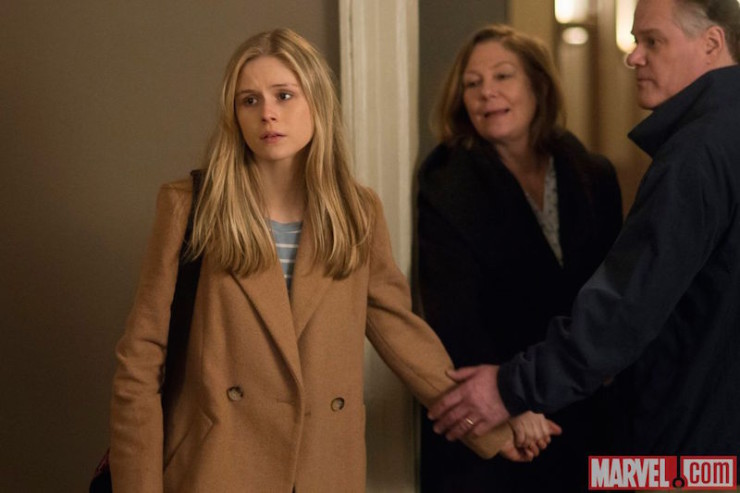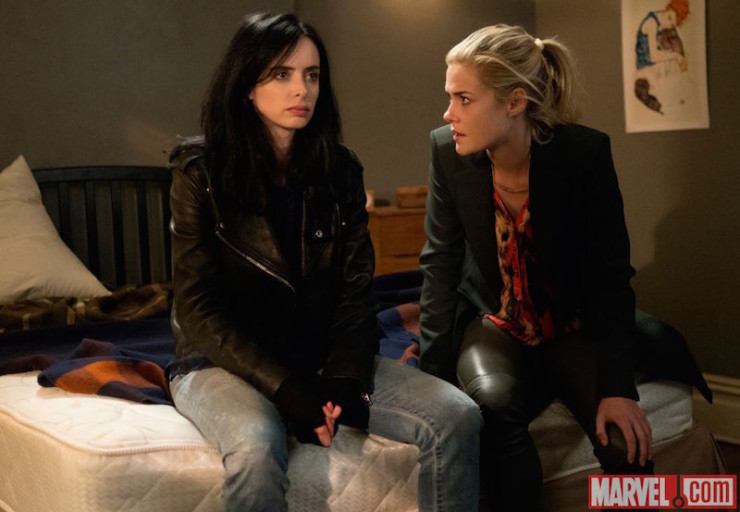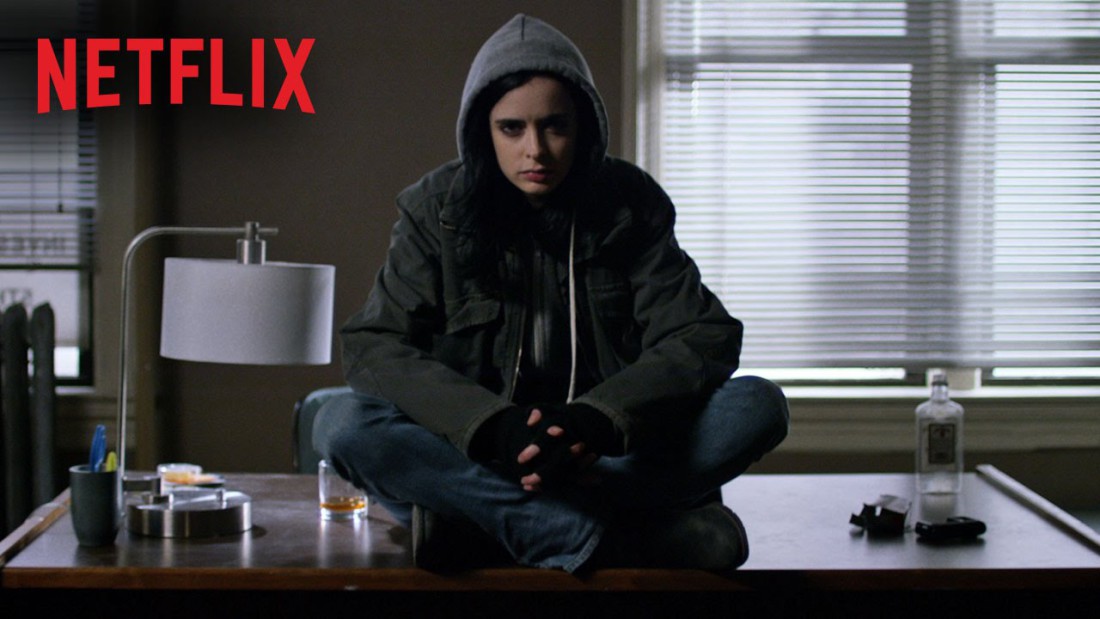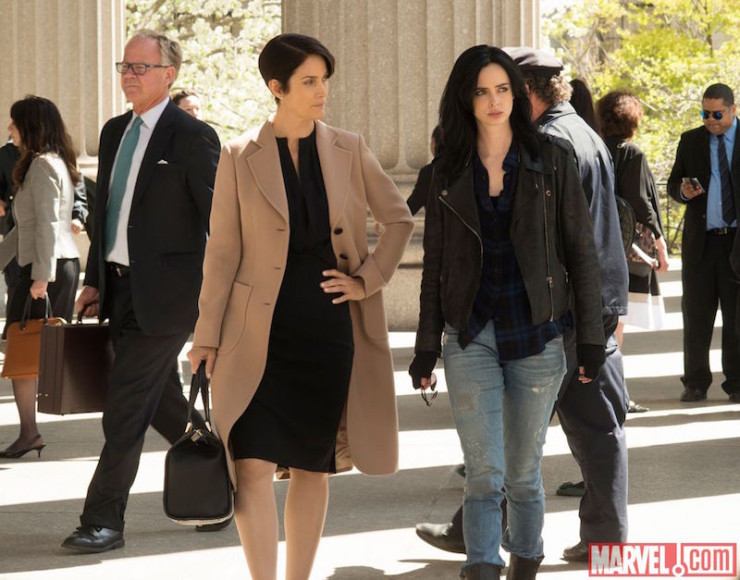Hot off her Alias reread, Tansy Rayner Roberts reviews Netflix’s Jessica Jones. In this post: “AKA Ladies Night” and “AKA Crush Syndrome.” Spoilers for season 1.
“AKA Ladies Night”
Written by Melissa Rosenberg
Directed by S.J. Clarkson
“New York may be the city that never sleeps, but it sure does sleep around.”
Meet Jessica Jones (Krysten Ritter): a weary noir voiceover attached to a sarcastic private detective with a drinking problem and a mean left hook. She also has superpowers, but be cool, we’re being subtle here. Jessica describes her job as being about “finding dirt” AKA catching out cheaters, and then having to break it to their significant others.
After throwing an angry client through the glass pane in her own office door, we watch Jessica making her way through her seedy life in a seedy part of the city, pointedly not looking at posters of a certain happy blonde talk show host (though the camera lingers).
Jessica juggles several cases during this episode, in great Chandleresque tradition of the multi-tasking detective. She hustles corporate lawyer Jeri Hogarth (Carrie-Ann Moss) into giving her work despite having turned down a more permanent position, and the two of them analyse Jessica’s highly erratic (but effective methods.
Jessica also spends some time taking shots of local bartender Luke Cage (Mike Colter) indulging in an illicit hookup, because it’s that or admit her own insomnia.
Why does no one in this city ever close their blinds? Have they not watched Rear Window or Veronica Mars? This answers the question about whether or not Jessica and Luke know each other yet. If he were properly acquainted with her, he’d know how important it was to not smooch ladies in front of an uncovered window.
Jessica is clearly suffering from PTSD, which creeps up on her in inadvertent moments, characterised by a purple light palette shift and whispered words or gestures from a man in her past. It’s David Tennant, you guys, creepier than you’ve ever seen him before. Who’d have thought it would be unpleasant to watch him lick someone?
A new case on Jessica’s books involves a missing young college athlete called Hope, who has two loving parents and has obviously been manipulated by her new boyfriend into ditching her perfect life.
At first this looks like a mundane case. Hope’s Dad is adorably down to earth, so distracted by Jessica’s broken door that he nags her about tools so he can fix it for her. It’s clear she has no idea what to do with parental attention.
“And leave a woman living alone in this city with no lock and no door? It’s not safe.” Bob is the best. We like Bob.
Jessica’s lack of respect for doors and security continues throughout her investigation, whether she’s carefully timing a walk-through to avoid being buzzed up to buildings, or discreetly breaking into an apartment (with people inside) rather than repeating her knock. She leaves broken locks and splintered wood wherever she goes!
Hope’s roommate insists there is no mystery—it’s just a girl getting a dodgy boyfriend and flaking out, happens all the time.
Serving a summons to Hogarth’s difficult customer, Jessica intimidates him with her car-lifting abilities, mocks him with the possibility that she has laser eyes, and gets the job done. So that’s what Hogarth meant by her “methods,” huh?
It’s hard to tell if Jessica was stalking Cage for a job or for herself, and the lines blur when he catches her creeping outside his bar, and invites her in for “ladies’ night,” which apparently means she doesn’t have to pay for her drinks, because she’s hot.
The best sex scenes are those that tell us something about character. Luke and Jessica’s hookup is packed full of it, as they’re both equally determined to have a “no feelings” one night stand, and also to discreetly indulge in rough sex without hurting the other person, or letting on that they both have superpowers.
Jessica tracks Hope’s “only for emergencies” credit card through lingerie purchases and other boyfriend-bait to a restaurant where she and her man dined recently. Suddenly Jessica’s own past trauma becomes horribly relevant. Hope isn’t just another girl with a controlling boyfriend. Her “boyfriend” controls everyone. The waiter is still faintly traumatised that he can’t remember why he comped a $500 bottle of wine for their table, or why it seemed like a reasonable idea for an Asian Fusion restaurant to provide pasta amatriciana.
Through purple-lit flashback, we learn that Jessica was once in Hope’s place, controlled by Kilgrave and happy to do (and feel) whatever he told her to. His behaviour with Hope is following a very exact “one month anniversary” pattern, and that means Jessica knows where he will be—but more to the point, she’s pretty sure he’s done all this to make a point to her.
Devastated and terrified, Jessica tries to get money out of Hogarth so she can bug out to Hong Kong, and when that doesn’t work, she calls on the closest thing she has to a friend (though she has already stated she doesn’t have friends)—celebrity talk show host Trish Walker (Rachael Taylor).
Trish tries to convince Jessica that it’s her PTSD making her think Kilgrave is still alive, but is willing to believe her friend is in danger. She gives Jessica the money to run, though it’s clear she expects better of her—like, rescuing the girl, maybe? Jessica is wrapped up in her own past guilt. She thinks of her own powers as a liability when dealing with Kilgrave.
TRISH: You’re still a person who tried… to do something.
JESSICA: Tried and failed. That’s what started this. I was never the hero that you wanted me to be.
Jessica’s our hero, though, and despite resisting the call until the last minute, she finally sucks it up and goes to the hotel to face her demon… but he’s not there.
Hope (Erin Moriarty) has been lying still in the hotel bed for hours, alone, unable to move because he told her not to. Jessica drags Hope kicking and screaming from the hotel. Back at Jessica’s apartment, she reunites the traumatised girl with her parents, and breathes a sigh of relief as she sends the three of them home to Omaha, knowing that with enough distance and time, Kilgrave’s influence over Hope will diminish.
She spoke too soon. As the lift doors close behind the family, Hope produces a gun, pulling the trigger until there are no bullets left…
In the final moments of the episode, Jessica walks away, abandoning a screaming Hope and her dead parents in the lift—but once she’s taken a breath of fresh air and accepted her responsibility, she returns to deal with the clean up, because that’s who Jessica Jones is.
Comics and Continuity:
While the script does not replicate the same narrative as the Alias comics (nor should it, though I don’t think I’m alone in wishing they’d incorporate the Captain America sex scandal) there are so many nods to the source material in this first episode, including the angry client crunching through the glass in Jessica’s door, the scene with her sitting on the toilet, and even Luke and Jessica’s preferred sexual position.
Michael Gaydos has been acknowledged as a creator of Jessica Jones along with writer Brian Michael Bendis, and it’s clear that his aesthetic has been massively influential on the visual style of the show, including the shifting colour palette, and the tilted camera angles that feel at times like they’ve been borrowed from A Touch of Evil or similar film noir classics.
David Mack, meanwhile, whose collage covers were so integral to the original and recent reprint runs of Alias, provides artwork for the credit sequences.
One significant change is that Jessica’s apartment is also her office in the TV show—which makes sense from a New York rent point of view, but seems horribly unsafe considering how awful so many of Jessica’s clients turn out to be. And, you know, that her druggie neighbour keeps wandering in to steal her peanut butter.
It is, of course, horribly unsafe, but Jessica constantly treads the line between over-confidence (thanks to her superpowers) and punishing herself, so her living arrangements make a perfect, awful kind of sense.
Trish Walker AKA Patsy Walker or Hellcat, takes the place of Carol Danvers as Jessica’s distanced best friend, and that relationship comes across clearly here, the combination of frustration and tension that comes from having tried for too long to help a loved one who keeps pushing you away. Trish is more sympathetic than Carol was in Alias, and a big part of that is that she is more understanding of what Jessica went through, and why Kilgrave is such a monster.
Luke Cage feels exactly in character from the comics, the only difference being that he is meeting Jessica for the first time, rather than being an old friend well acquainted with her shit. (If the next season of Daredevil could feature Luke and Jess reluctantly hired to play bodyguard for Matt Murdock, I would be a very happy woman)
Jeri Hogarth is a fantastic character, an antagonistic ally (for now, not sure which direction they’re taking her in) whose role feels very much like one that most television producers would cast male—down to the harried wife and affair with the pretty secretary, which would be beyond cliché if a male actor played the part. She actually is a genderbent version of Jeryn Hogarth, one of Iron Fist’s retinue of paternal characters. Carrie-Ann Moss’s scenes with Ritter are fantastic, bringing home that despite the prominence of Luke Cage and Kilgrave, this is a superhero story revolving around women.
I often come back to Veronica Mars for reference, another female-centered noir detective TV series. Jessica has many elements in common with Veronica, including a tortured past, a strong sense of isolation from former friends and allies, and an overwhelming sense of justice that has been almost but not quite beaten out of her. The big difference between the two stories is that Veronica’s original ensemble was all-male.
The other comparison that most people are going to make is between Jessica and her Netflix hero counterpart, Daredevil. I think it’s interesting that Daredevil devoted several episodes to building up Matt Murdock, his character and his purpose, before fully introducing the Big Bad of his season, Wilson Fisk. The same was true for Jessica Jones in Alias—the comic placed hints about her past trauma and her reasons for quitting superheroics, but we didn’t get the full Purple Man/Kilgrave reveal until the last story arc of the final trade of the series.
With this version of Jessica Jones, we’re in on the Kilgrave mystery from the start. His presence as a creeping menace through the city provides a sense of dread, one purple-lit flashback at a time.
The power of the Alias story was that Jessica was isolated, with no one else understanding what Kilgrave had put her through—but it’s even more powerful to see Hope’s experiences mirror those of Jessica and give her something important to fight for. Trying to free Hope of Kilgrave, and failing, makes for a devastating blow, but sets Jessica up as our broken hero, the one we will follow anywhere.
If she can prove Hope isn’t responsible for Kilgrave’s actions, maybe Jessica can learn to forgive herself too…
“AKA Crush Syndrome”
Written by Micha Schraft
Directed by S.J. Clarkson
Jessica becomes her own client, tracking down the mystery of how Kilgrave survived a bus crash she believed had killed him over a year ago. Her aim is to prove Hope’s innocence of murdering her parents, and “temporary insanity” isn’t going to cut it. She needs evidence that there is such a thing as a man who can brainwash others with his very proximity—first to prove it to Jeri Hogarth’s satisfaction, in order to convince the other woman to defend Hope.
(Cough, I hope there are other Veronica Mars fans out here who keep blinking at the use of the term “bus crash” in conjunction with Krysten Ritter. It’s not just me, right?)
Following the trail of former victims, Jessica’s isolation unravels—in searching for evidence that Hope’s plight was real, she is also gathering proof of her own past trauma. Ha, and she claimed to be avoiding therapy!
In one of the most powerful scenes of the episode, Hope describes how Kilgrave made her jump for hours, as high as she could, and how he always told her that Jessica was the best at it. He made her feel like nothing, because even as a star athlete who specialised in long jump, she couldn’t stack up to the woman with super powers.
Hope suggests that Jessica should kill herself, reflecting Jessica’s own fears about Kilgrave getting control of her again—her body, with its super strength, could be a terrible weapon in his hands.
The loss of dignity and autonomy, and the lingering effect of Kilgrave’s abuse long after his powers have ceased to hold her, is Jessica’s issue as much as it is Hope’s and gives her a powerful reason to help the young woman.
We see this pattern repeated when Jessica tracks down the ambulance driver who is brain damaged from a stroke, and living on permanent dialysis after “voluntarily donating” both his kidneys to Kilgrave to ensure his survival. And again, when she hunts down the doctor who performed the surgery. Both these men are traumatised by what they did and agreed to under Kilgrave’s influence, as much because it felt voluntary as because of their actual actions.
The doctor is Jessica’s chance to convince Hogarth, and she pushes him into giving testimony. She may not have realised, however, that by pushing Hogarth to help Hope, the lawyer will learn more about Jessica herself than she ever intended.
The doctor also gives Jessica a clue as to how she might actually get the jump on Kilgrave—surgical anaesthesia, which dampens the effect of his powers in a way that sleep does not.
Jessica’s abusive relationship with doors continues throughout this episode, particularly when she confronts her noisy upstairs neighbours, only for the brother of the screamer twins to imprint on her like a baby duckling. The precariousness of her sense of safety is still represented by the cardboard sealing up her own broken door, especially when she almost kills an intruder in her apartment, who turns out to be a door repairer that Trish sent.
Jessica and Trish both want to repair their broken friendship and keep each other safe, and they communicate this through screaming at each other a bunch. We learn that they were flatmates once, but while Trish wants Jessica to come home and be “safe” behind her security system and doorman, Jessica’s own definition of “safe” is very different—an empty apartment and no friends nearby means no one who can be used by Kilgrave to get to her.
Her no friends policy, of course, was ongoing even when she believed Kilgrave to be dead…
JESSICA: Don’t… have feelings, okay?
TRISH: Not okay!
What Jessica doesn’t know is that Trish is working with a personal trainer to become a dangerous weapon herself—and she’s brutal!
Luke, meanwhile, is pissed at Jessica because the police showed him photos that she took of him with Gina, a woman he regularly sleeps with—and those photos have at least slightly implicated him in Hope’s case.
Jessica claims that she was hired by Gina’s husband to prove she was cheating on him with Luke—but that may not be the whole truth. After Luke confronts Gina and she rushes home to talk to her husband, he claims no knowledge of Jessica. The husband is, however, mad enough now to get a posse of rugby buddies together and attack Luke.
Jessica joins the bar brawl to help Luke even the odds (it’s a great fight scene, showing Luke’s cool, unflinching technique, and Jessica’s own more chaotic style, which includes doing random damage to poor inoffensive phones). The two reveal more to each other than they intended about their strength, especially when a piece of broken glass shatters instead of cutting Luke’s throat.
Kilgrave finds a new apartment in which to hang out, imposing himself on the family who lives there with a stunning casual cruelty that is only going to get worse. David Tennant proves he can be terrifying even without his face fully in focus—entire scenes revolve around how intimidating the back of his earlobe can be.
Speaking of apartments, Luke tracks Jessica to hers (that broken door is the gift that keeps giving!) and forces a conversation she doesn’t want to have, about their mutual superpowers—proving his own claim by applying the door repairer’s abandoned power tools to his mighty abs.
Luke Cage has no respect for power tools! (I choose to believe he broke it deliberately out of revenge for that phone Jessica broke in his bar.) Has Jessica Jones finally found a man she can’t damage?
LUKE CAGE: You can’t fix me. I’m unbreakable.
I think he’s assuming a lot to think Jessica wants to fix him, considering how long it’s taken her to do anything about her door.
Comics and Continuity:
The interrogation of Jessica at the beginning of the episode nicely reflects that in issue 2 of Alias, only it is a much shorter scene!
The legal ramifications of Hope’s situation is a crucial example of the difference between the two universes inhabited by the two versions of Jessica Jones: in the Marvel Comics Universe, superheroes and all manner of screwy magical hijinks have been long established, for decades. The Avengers might not be fully aware of how badly Jessica was affected by her experience with Kilgrave, but at least his existence is something no one is going to argue with.
In the Marvel Comics Universe, actual comic books are taken as official documentation of real life events, and are used as formal evidence and precedent in court cases!
In the Marvel Cinematic Universe, there have still only been a handful of documented superheroes, and while Thor might appear on the nightly news from time to time, that doesn’t mean there’s legal precedent for the existence of paranormal powers, outside the (destroyed) S.H.I.E.L.D. filing cabinets.
Netflix Jessica doesn’t have a Jennifer Walters or equivalent to hire as an expert in Superhuman Law—which is why she has to go to so much trouble to convince Jeri Hogarth that there is a case worth fighting.
(Does anyone else want the She-Hulk spinoff where Jen Walters goes to work for Jeri Hogarth? I DO.)
Jessica Jones also doesn’t have Jean Grey to help her deal with Kilgrave’s brainwashing effect. She only has the “real world” resources she can bring to bear on the situation.
Meanwhile, questions remain about these versions of the characters. What is the significance of the “Alias” name, to Trish and Jess? We still don’t know what their heroic past was together. Obviously they weren’t in the Avengers, but there’s something we haven’t been told yet. Also, if Jessica wasn’t creeping on Luke for a client, why was she taking pictures of him in the first place?
Luckily, we don’t have to wait around to find out!
Tansy Rayner Roberts is a Marvel Comics tragic, and a Hugo Award winning blogger and podcaster. Tansy’s latest piece of published short fiction is “Fake Geek Girl” at the Review of Australian Fiction, and she writes comics reviews on her own blog. You can find TansyRR on Twitter & Tumblr, sign up for her Author Newsletter, and listen to her on Galactic Suburbia or the Verity! podcast.















You’re not the only VM fan who gets tripped up by/amused by the similarities. I also did a momentary double take when you referred to Gina, thinking you were referring to Ritter’s character Gia (and made the kind of typo I always make).
Veronica Mars fans should go next to IZombie, which actually is a Rob Thomas show, has many elements in common with VM & JJ, and will be hugely refreshing/relaxing/entertaining when we’re all staggering around coping with the emotional whiplash and drama of Jessica Jones.
Yes, that’s right, the zombie show is comic relief after this!
Does not respect doors…or padlocks securing doors or lockers for that matter.
Nine episodes in and I’m hooked. Great show.
Jeri Hogarth is a … genderbent version of Jeryn Hogarth, one of Iron Fist’s retinue of paternal characters.
No, she’s not, and that’s a problem for me. Jeryn Hogarth was created by Chris Claremont and John Byrne as a direct lift of Robert Anson Heinlein’s elderly mentor character Jubal Harshaw, from “Stranger in a Strange Land,” helping enormously with the riff that Danny Rand is Valentine Michael Smith.
Moss’ Jeryn “Jeri” Hogarth is none of those things. She’s a great character, complex and human, but she is nothing like the character who confronted Danny Rand aboard a private jet in Iron Fist #5.
Since she’s a completely original character, why not give her a name of her own, and leave the name Jeryn Hogarth for the makers of “Iron Fist,” if they want to use the character as he was originally created and intended?
I watched episode one last night and it was too much for me. It was very good, and maybe people watching who haven’t experienced rape or abuse and PTSD will understand it better after watching this. But for me it hit too close to home and left me a wreck. I cannot watch more. I applaud the makers for achieving that without being the least bit gratuitous.